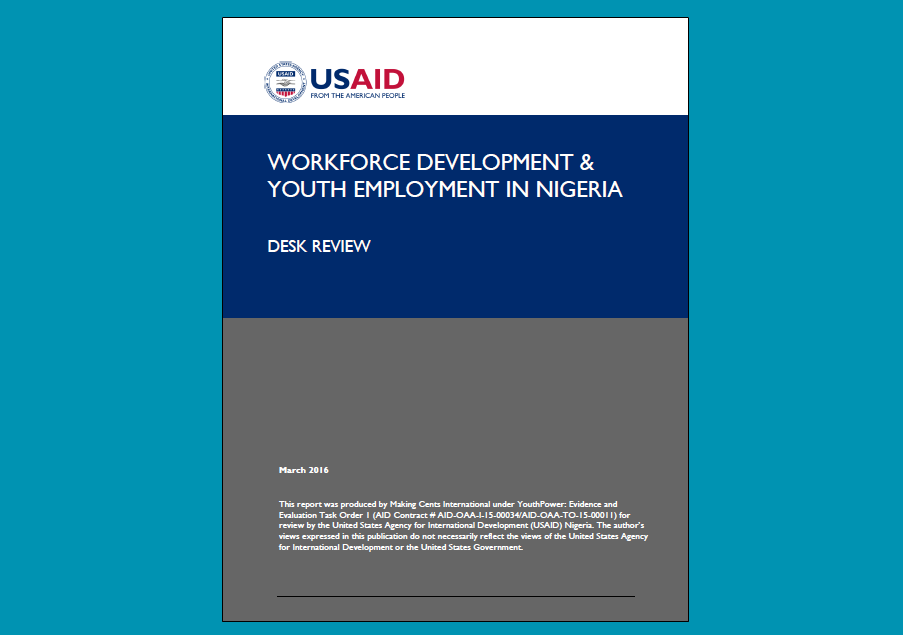
Project Prime and Partners
YouthPower Learning managed by Making Cents International (Prime)
International Center for Research on Women (Partner)
Khulisa Management Services (Partner)
Key Researchers
Dr. Caroline Fawcett, Making Cents International
David Feige, Making Cents International
Hillary Proctor, Making Cents International
Dr. Mo Adefeso-Olateju, Making Cents International
Dr. Marc Sommers, Making Cents International
Stella Mukasa, International Center for Research on Women
Dr. Mark Bardini, Khulisa Management Services
Publication Date
March 9, 2016
Project Goals
The goal of the Workforce Development and Youth Employment in Nigeria Desk Review was to conduct an assessment of the youth employment landscape. The report offers relevant details on larger contextual issues that frame workforce development and youth employment, such as economic growth and employment trends, the policy and enabling environment, educational stocks and flows, and available workforce development services. Primary and secondary data sources were used (e.g., statistical reports, key informant interviews, focus groups) that were gathered using both desk and field research strategies.
Brief Background
Although Nigeria boasts the largest economy in Africa with a GDP of $510 billion, economic growth declined in 2015.Nigeria's economy has failed to produce good jobs for the vast majority of Nigerians, especially in the formal sector. The official unemployment rate of 7.5% masks large numbers of underemployed workers, many of whom rely on seasonal work and subsistence agriculture. When these are taken into consideration, nearly a quarter of all Nigerians lack full-time employment; including almost half of all young people.
The lack of formal sector job opportunities can be traced to Nigeria’s business environment. Corruption, lack of access to capital, and the poor state of the country’s infrastructure have stifled the growth of the country’s 17.3 million Micro, Small, and Medium Enterprises (MSMEs), an overwhelming 99.87% of which are microenterprises and which collectively produce only 32.4 million jobs, fewer than two per enterprise. This will be grossly inadequate to accommodate the coming youth bulge, which will double the number of youth in 20 years.
Competing for this limited number of jobs is a youth population where one quarter of all students fail to attend primary school and only one in four of those who do graduate advance to secondary school. Dropout occurs principally after sixth grade and after secondary school. The high number of dropouts underscores the important role that the country’s Technical Vocational and Education Training (TVET) system could potentially play to bridge the skills gap.
However, training services in Nigeria are fragmented and under-resourced. TVETs and apprenticeships offer skills development, but personal connections are often needed to obtain admittance, curricula are not standardized, and workforce training is not aligned with private sector needs. Both regulation and enforcement of the technical training sector are weak. TVETs are often in urban centers inaccessible to rural youth. Demand outstrips supply, reducing the incentive for TVETs to reach out to underserved groups. Most importantly, however, most young people lack access to the system due to limited enrollment capacity, insufficient education, inadequate understanding of and ability to access the system, or geographic proximity. Gender plays a key role in school-to-work transitions as young women face challenges such as early marriage, childbirth, lower educational attainment, and limited ability to own land and other assets.
Key Findings
The report concludes with some lessons learned. Although evidence on the impact of workforce development programs is limited, we have identified the following lessons:
- Comprehensive programming that deals with both supply and demand tends to be most effective;
- Programs designed for urban populations cannot be easily replicated in rural areas, and scant information exists about what works well for rural youth:
- Labor market information systems are important and effective, but are more so when the educational system is used as a platform, rather than using one-stop shops;
- Training is more effective when combined with asset provision;
- Most TVET programs have not been shown to have much impact on short-term job placement or income generation; and
- There is little evidence that employment mitigates conflict reduction, but research supports conflict-sensitive approaches.

Document Details
Title: Workforce Development and Youth Employment Assessment in Nigeria: Desk Review
Language: English
File Size: 1.5 MB
Download the document.
Share this document.

